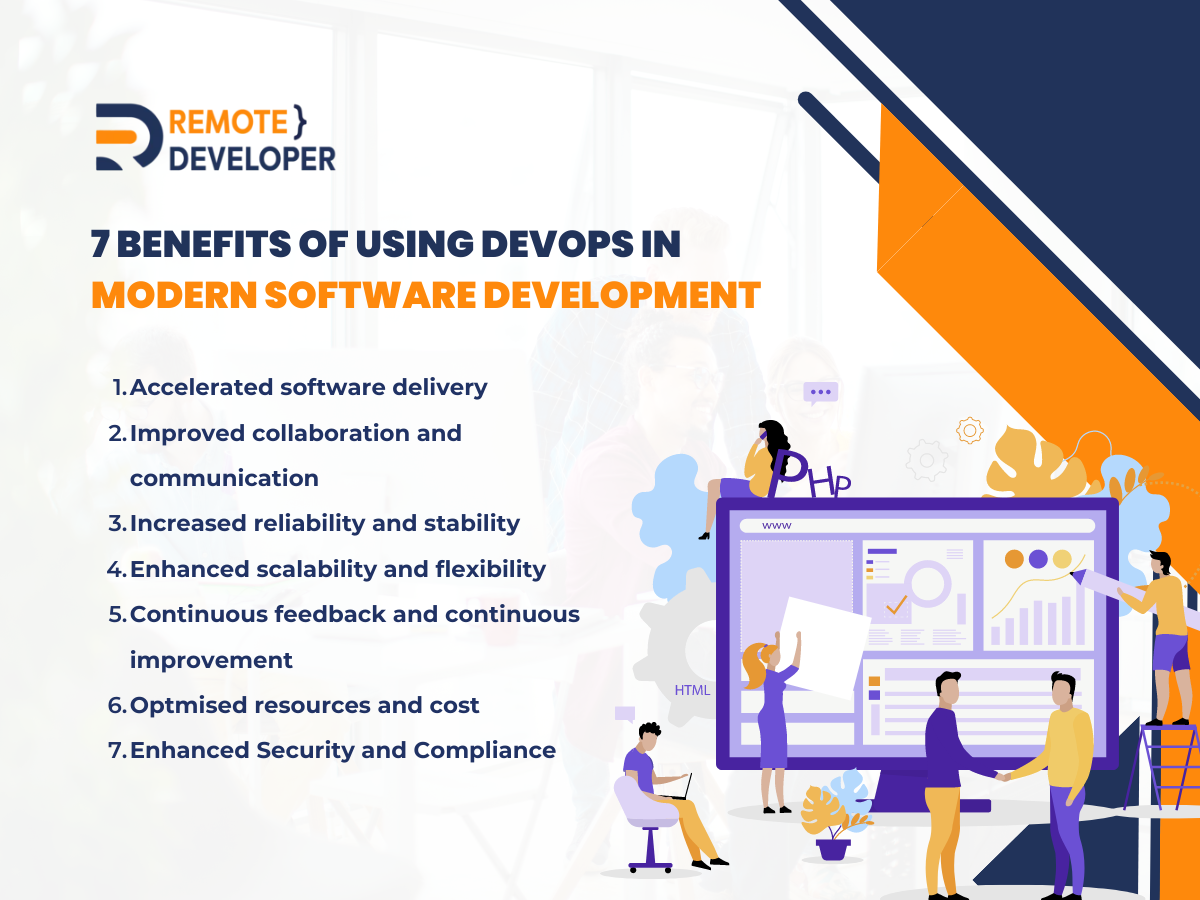In today’s rapidly evolving technological landscape, the successful delivery of high-quality software products has become paramount for businesses across industries. To meet the increasing demands of users and stay ahead in the competitive market, organizations are turning to DevOps.
DevOps has emerged as a critical factor in achieving success in the software industry, from accelerating the delivery process to enhancing collaboration, scalability, and reliability. This transformative approach combines development and operations to optimise software delivery and improve efficiency.
In this article, we will explore the importance of DevOps in modern software development and how it addresses critical challenges development teams face.
What is DevOps?
DevOps is a set of practices that integrates IT operations and software development to deliver high-velocity applications and services. It focuses on automation, collaboration, and communication between developers and IT professionals to increase the speed of development cycles while reducing operational costs.
Likewise, DevOps aims to improve the quality of software products by making them more reliable, secure, and scalable. By utilising DevOps practices, organisations can move faster in their software delivery process while providing a better customer experience.
7 Benefits of Using DevOps in Modern Software Development
DevOps, an approach that combines development and operations, has gained significant popularity in modern software development. It brings many benefits that contribute to the success of software projects. Here are some key advantages of adopting DevOps practices:

1. Accelerated Software Delivery
DevOps in modern software streamlines the development lifecycle by automating processes and enabling continuous integration, delivery, and deployment. It emphasises the automation of manual and repetitive software development, testing, and deployment tasks. By automating processes such as code compilation, testing, deployment, and infrastructure provisioning, teams can eliminate time-consuming manual work and reduce the risk of human error. Automated pipelines ensure that software changes are built, tested, and deployed consistently and reliably, leading to faster and more efficient delivery.
This results in faster and more frequent software releases, allowing businesses to quickly respond to market demands, deliver new features, and gain a competitive edge.
2. Improved Collaboration and Communication
DevOps in modern software development promotes a culture of collaboration and cross-functional teamwork. It emphasises close collaboration between development teams, operations teams, and other stakeholders involved in the software delivery process.
In DevOps, developers and other stakeholders work closely together, sharing knowledge, aligning goals, and breaking down communication barriers. As such, teams can align their goals, share knowledge, and work together to streamline the delivery process. In addition, some DevOps tools facilitate real-time communication, enabling faster decision-making and issue resolution.
This collaborative approach enhances efficiency, reduces errors, and fosters innovation.
3. Increased Reliability and Stability
DevOps in modern software development is crucial in increasing software reliability through various practices and principles focusing on proactive measures, continuous testing, and efficient feedback loops.
By implementing these practices, DevOps helps identify and address issues early in development. This leads to more reliable and stable software releases, minimising downtime and improving the user experience.
4. Enhanced Scalability and Flexibility
DevOps in Modern Software Development enables organisations to scale their software infrastructure quickly and efficiently. It allows companies to adapt and respond to changing business needs by implementing practices and strategies such as the following:
- Infrastructure as Code (IaC). DevOps leverages infrastructure as code principles, allowing teams to define and manage infrastructure configurations using code.
- Automated Deployment and Orchestration. Automated deployment and orchestration streamline the scaling process, enabling organisations to easily replicate and deploy software components in various environments for development, testing, or production.
- Continuous Integration and Continuous Delivery (CI/CD). This ensures that code changes from different developers are merged and validated regularly, reducing integration issues.
- Microservices Architecture. In this approach, software applications are broken down into smaller, loosely coupled services. This enables teams to scale and update individual services independently, making it easier to handle changes and meet specific scalability requirements.
- Elastic and Cloud-based Infrastructure. Cloud platforms provide on-demand resources and scaling capabilities. This allows organisations to easily add or remove resources, respond to sudden spikes in usage, and optimise costs while maintaining flexibility and scalability.
This scalability and flexibility support dynamic business needs, ensuring that software systems can adapt to changing requirements and handle increased workloads.
5. Continuous Feedback and Continuous Improvement
DevOps encourages a feedback loop, where real-time feedback from users, stakeholders, and monitoring systems is integrated into the development cycle. Here’s how DevOps encourages continuous feedback and improvement:
- Advocates or continuous integration and delivery practices involve frequent integration and delivery of code changes. This can make teams receive constant feedback on their code, enabling them to identify issues and improve their skills.
- Promotes the practice of conducting post-mortems and retrospectives after incidents or releases. Most DevOps teams involve retrospectives, allowing teams to reflect on the past iteration or sprints and evaluate what went well and what needs to be improved.
- Encourages gathering feedback from end-users. DevOps encourages seeking feedback and incorporating it into the development process. This enables a team to identify development priorities and guide continuous improvement based on the actual expectations of users.
This feedback loop facilitates continuous improvement, enabling teams to iterate on features, address issues, and optimise performance throughout the software development lifecycle.
6. Cost and Resource Optimisation
DevOps in Modern Software Development optimises resource utilisation, reduces waste, and minimises manual effort through automation. Automating repetitive tasks and standardising processes enables organisations to allocate resources more effectively, reduce operational costs, and maximise the value delivered by their software projects.
Similarly, DevOps promotes collaboration and communication among development, operations, and other stakeholders. This collaborative culture improves transparency, reduces miscommunications, and minimises rework. By fostering effective collaboration, DevOps helps identify and resolve issues early, preventing costly delays and rework caused by misaligned requirements or misunderstandings.
Likewise, DevOps embraces a culture of continuous improvement. By conducting regular retrospectives, analysing metrics, and leveraging feedback, companies can identify areas for development and implement changes that lead to cost reductions. Continuous improvement practices enable organisations to streamline processes, optimise resource utilisation, and eliminate waste, resulting in long-term cost savings.
7. Enhanced Security and Compliance
DevOps incorporates security and compliance measures as an integral part of the development process. Security practices, such as automated vulnerability scanning, continuous security testing, and secure coding practices, are woven into the software development lifecycle. This ensures that security and compliance requirements are met, reducing the risk of data breaches and other security incidents.
Utilise DevOps in Modern Software Development
In conclusion, the importance of DevOps in modern software development cannot be overstated. In today’s fast-paced and competitive business landscape, organisations strive to deliver high-quality software products efficiently and reliably. DevOps provides a transformative approach that addresses critical challenges faced by development teams and promotes a culture of collaboration, automation, and continuous improvement.
Embracing DevOps is not just a technical choice but a strategic decision that empowers organisations to stay competitive, deliver innovative solutions, and meet the evolving needs of their customers in the dynamic world of software development.
Learn how to harness the power of DevOps with Remote Developer! Contact us today!

